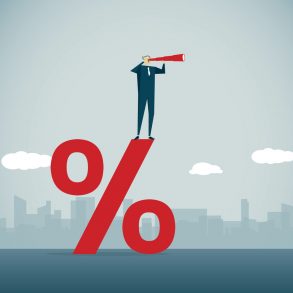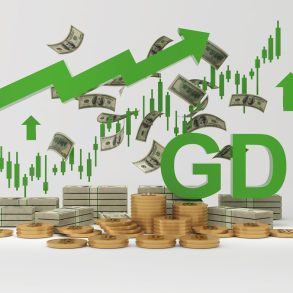 The Bank of Canada held the line today and left the country’s pace-setting overnight rate at 1%.
The Bank of Canada held the line today and left the country’s pace-setting overnight rate at 1%.
The news, however, is not what the BoC did, but what it hinted at doing.
Governor Mark Carney and co. jostled expectations in their prepared statement, which said:
 “Overall, economic momentum in Canada is slightly firmer than the Bank had expected in January.”
“Overall, economic momentum in Canada is slightly firmer than the Bank had expected in January.”- “…The economy is now expected to return to full capacity in the first half of 2013.”
- “…The profile for inflation is expected to be somewhat firmer than anticipated.”
- “Europe is expected to emerge slowly from recession in the second half of 2012”
- “In light of the reduced slack in the economy and firmer underlying inflation, some modest withdrawal of the present considerable monetary policy stimulus may become appropriate.”
This last point, in particular, has put the bond market on edge. As of this writing, 5-year yields are up seven basis points since this news broke, and up 10 bps on the day. (Bond yields lead fixed mortgage rates.)
Prior to this morning’s announcement, the market expected the Bank of Canada to move rates in early 2013. We could now start seeing some economists shift rate hike predictions to Q4 of this year. BMO has already moved up its forecast by six months to year-end 2012, according to BNN.
The BoC will still want to see more data before pulling the trigger, however. Canada remains tightly constrained by cautious U.S. growth, and that growth has had a funny habit of disappointing after optimistic spurts in the spring.
We also have the same contingent of Eurozone countries still battling ongoing solvency fears.
Pending the next few months of domestic data, the storylines in the U.S. and Europe have the potential to continue weighing down Canadian rates.
For now, today’s BoC decision to leave the overnight rate at 1% means that prime rate should remain at 3.00%.
The next Bank of Canada rate meeting is June 5.
Rob McLister, CMT







Europe showing signs of emerging from the depths of recession, says carney.Huh? i dont know which newscasts he’s been listening to but isnt that just a tad overly optomistic or unrealistic.
If I read the BOC press release correctly, rates could rise sooner than expected but not by much. I wouldn’t be surprised to see 3.50%-3.75% prime by early 2013 and then little change for another year or so.
Hey there Just A Guess….thats the best prediction i’ve seen this morning after listening to the biz channel and reading online…it makes sense..slite rise sooner than later, then adopt a wait and see position….thats sort of the canadian way in general….good one….
yup
Anyone want a variable rate now? :)
Cautiously optimistic about the depression-era rates of unemployment in europe?
Optimistic about the increase in low quality, minimum wage and part time jobs in the USA, and the ongoing collapse in the american real estate market?
Optimistic about record levels of consumer debt in canada?
I for one disagree with Carney’s rosy view of the domestic and global economy.
Unemployment’s at 5.7% in Germany and 10% in France, hardly “depression era.” Yep, things are horrible in Greece and Spain, but they’re tiny by comparison.
Unemployment IS going down in the US — things are getting better, though not at a rate anyone likes.
Smart minds are saying US new home construction has bottomed, and reale prices are close.
I’m not confident in the ECB and friends, but things aren’t as dire as you’re making out.
LOOK, THE SKY IS FALLING. BETTER PUT ON YOUR TIN FOIL HAT! I disagree with all your findings:
“depression-era rates of unemployment in Europe” What’s happening in Spain or Greece is hardly reflective. Unemployment Rates are still single digits in all the European countries that matter (measured by GDP).
As for U.S., the real estate crisis looks to be stabilizing and stock markets reflect cautious optimism.
As for Canada, consumer debt is also associated with higher wealth and income growth. Also, Carney doesn’t have a rosy view. He is calling for balanced 2.4%/2.4%/2.2% growth 2012-2014.
Your overall pessimism is not shared by the masses.
Your overall pessimism is not shared by the masses.
No, I think he nailed it:
http://www.conferenceboard.ca/topics/economics/consumer_confidence.aspx
Up from “We’re all gonna die!” certainly, but below normal.
sure, at Prime -.9
The real estate market in the U.S. isn’t collapsing. It’s correcting. For normalcy to return, it has to correct. The consumer and the economy won’t return until 1) consumers have paid down debt and 2) new families don’t have to go so crazy deep in debt for owned shelter.
Everything else you said is right on.
Lol @ Carney. We need a word that fits between recession and depression that would better describe the situation around the world. You gave low rates so people could afford mortgages and to take second mortgages to renovate, buy a car, or take a vacation and your worried about excessive debt? This is capitalism my friends.
Scuttlebutt is, banks trying to lobby new PCSs (Prime Collateralized Securities) that would be rated by ‘independent entities.’ Of course, this is always the good ol’ switcheroo from one alphabet soup named security to another, and obviously another escape route to hide a plethora of toxic RE assets.
Banks are scrambling now that covered bond legislation is (always was) muerto on arrival. You’ll hear about it soon enough.
Low rates weren’t the issue, the banks that gave credit to everyone is the issue.
Credit availability is the issue, not the rates.
But as you said – capitalism – profit is needed.
I’m with you. Throw in the disappointing Canadian jobs report too.
Only bright spot will be a Republican November -if that fails then watch how bad things will be…
Are you referring to the most recent report, in which employment increased by 82,000, and the unemployment rate dropped by 0.2 percentage points? The one where increases were predominantly in private-sector, full-time employment?
If so, you might want to revise your expectations re: what constitutes a disappointing report, because you’ve set a pretty high bar.
so with all that is happening those 3% and less for 4 or 5 years are a good thing or not I have variable -65 below prime and don’t want to miss boat on lowest rate any opinions
Same here I have 2 mortgages one is prime -.70 and one is prime -.75 for another 3.5 years. Any opinions if I should hold or go fixed?
I’m in the same vote. I have a prime -.7 with ING with 3 years remaining but I can jump on a fixed of 3 or more years anytime I need. Would love opinions please!
thanks
IMHO, rates won’t rise high enough or fast enough to justify throwing away a rate like prime – .75. We are too geared to the US, which is facing a fiscal drain in January 2013.
http://www.moneynews.com/StreetTalk/Blinder-US-fiscal-Cliff/2012/03/19/id/433040
Expect 1-1.5% higher rates in Canada over the next few years. If you can handle those higher payments easily, hold tight.
LOL. He must be thinking we’re in November 2011. Turn a few pages on your calendar John.
Just saw the news and something came to mind. How about lowering the rate of credit cards to mortgage rates and then people wouldn’t need HELOC loans or what they should be called – second mortgages. Only losers would get 2nd and 3rd mortgages when I was growing up. Ah, growing up in a cash only family has made me a stickler for avoiding all possible debts.
I had a prime -1.0% (broker bought down) for 5 years which unfortunately just finished this month. Now I’m on a fixed at 3.29% for the next 5 years. Only reason I couldn’t get the 2.99% is because the property is a rental. But still happy with what I have now, and enjoyed the low variable rate while it lasted.
To all above:
I recommend my clients at Prime – .5% or better should definitely stay variable.
Between P-.2% and P-.5% depends on the client and their financial situation, but locking in at a .5% – .8% premium isn’t bad.
4 yr at 2.99% would have been a good time to consider locking in.
I am sorry to burs anybody’s bubble but USA 2008 collapse was just a beginning of a much deeper cycle to follow. Yes things are very dire indeed and inflation is about to kicj in to boot. If inflation rises over 4% in the US feds will have no choice but raise the rates but it will be at a huge cost to the economy because government also was to pay higher rates on their Huuuuuge debt. Disaster is lurking in near future, make no mistake about it.
Moe Bernanke propaganda and money printing to follow – what a joke and Obama is a puppet.
So why hasn’t inflation arrived yet? The Fed has been transparent about its actions. What do you know that the bond market doesn’t?